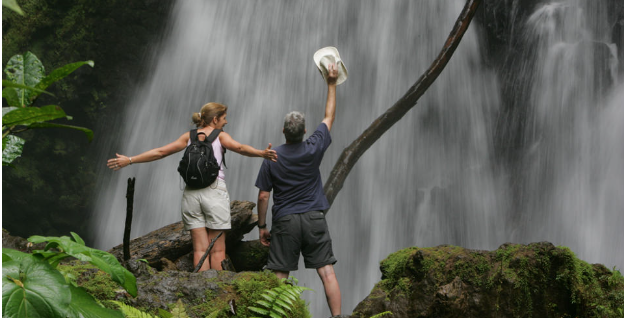In a world plagued by climate change, ecotourism is “a type of tourism that’s environmentally conscious, socially responsible, and sustainable.” It allows tourists to gain eco-friendly ways to explore natural wonders and culture, while also raising awareness for rapidly crumbling habitats. Overall, ecotourism provides a sustainable method to protect endangered areas while supporting local economies and raising awareness for environmental conservation.
In order to restore endangered environments, funding is necessary to complete conservation and restoration projects. Ecotourism stimulates the economies of local communities, which provides financial support for protecting wildlife and conducting scientific research. According to the International Centre for Ecotourism Research, “The best estimates find that global ecotourism pays for 84% of national parks funding and 99% of funding for the habitats of threatened mammals, birds, and frogs.” With historical precedent, the money generated from ecotourism is vital to preserve these habitats and ecosystems. According to Professor Martin Wikelski of Princeton University, “Ecotourism is one of the main factors keeping the Galapagos safe.” This funding is used to both enforce regulations on fishing and hunting, and support research programs to track biodiversity on the island. Ecotourism is also a self-sustaining system as the funding generated from tourists is partially used to maintain the infrastructure used to decrease the environmental impact of tourists.
Ecotourism also encourages responsible travel: when tourists visit these environmentally friendly areas, they learn about sustainable practices and how climate change can impact ecosystems. This inspires advocacy and support of research and ecological efforts. According to the International Union for the Conservation of Nature, “Receipts from ecotourism in many areas can counter demands to use the natural resources involved for more extractive economic purposes, and provide incentive to protect natural habitats. Local regions are often pressured to deplete natural resources to increase revenue; however, ecotourism can also generate money and support local environments at the same time. If people are not even exposed to these issues, they will not support the cause. However, when they learn about and experience the beauty and unique nature of these habitats, they will understand the importance of conserving these regions. There is no success in a cause, unless people are rallying behind it, which they can only do if they are educated.
Ecotourism also supports local economies, generating revenue for rural, small businesses. According to Rajashree Samal, a PhD scholar in social sciences and humanities, “ ecotourism generates $77 billion in revenue and makes up 5-7% of the overall travel and tourism market. It is one of the fastest growing sectors in the travel industry, with a growth rate of 10-30%.” The increase of tourists creates more jobs, puts more money back into the economy, and grows businesses. The indigenous communities who often live on these crumbling habitats can preserve their traditional lands while earning income to sustain these areas.
Although the benefits of ecotourism outweigh the cons, there are still some issues in ecotourism that need to be addressed. If not sustained properly, ecotourism could harm wildlife and further worsen these delicate environments.“ A report in New Scientist magazine warns that the massive growth of the ecotourism industry may be harming wildlife through stress, disturbance of daily routines, and even increased transmission of disease. While properly regulated ecotourism can be a good thing, many projects are “unaudited, unaccredited and merely hint they are based on environmentally friendly policies and operations”. To make sure that ecotourism is not dangerous, it is important to hold governments and large businesses accountable. When developing land, care needs to be taken to preserve its natural beauty. Overall, the benefits of ecotourism outweighs the risk and should be implemented throughout tourist locations.












